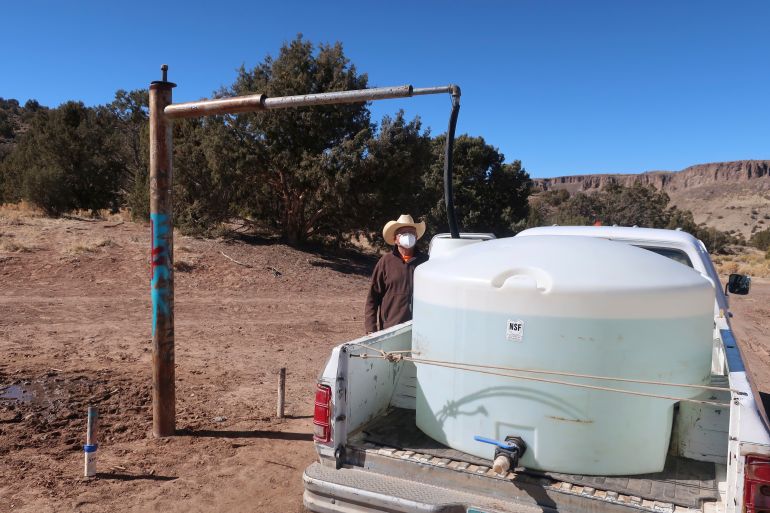US Supreme Court rules against Navajo Nation in water rights case
Indigenous community had sought to assess water needs amid historic drought in the Colorado River Basin.

The United States government does not have a responsibility to “take affirmative steps to secure water” for the Navajo Nation, the US Supreme Court has ruled, dealing a blow to the Indigenous community’s efforts to outline its water rights amid historic drought.
In a 5-4 decision (PDF) on Thursday morning, the top court said an 1868 treaty between the US government and the Navajo tribe that established the Navajo Reservation “reserved necessary water” for the community’s needs.
Keep reading
list of 3 itemsFive key things to know about the Colorado River
Photos: US mulls water cuts amid Colorado River crisis
“But the treaty did not require the United States to take affirmative steps to secure water for the Tribe,” the Supreme Court said.
Water has long been a top concern for members of the Navajo Nation, whose territory spans more than 6.8 million hectares (17 million acres) across parts of Arizona, New Mexico and Utah in the western United States.
It is estimated that approximately 30 percent of the roughly 175,000 residents who live on the reservation – the largest in the country – do not have running water in their homes.
The issue has taken on added importance as the Colorado River watershed where the Navajo Nation is located has been forced to consider significant water cuts amid the worst drought in more than 1,000 years.
Navajo Nation President Buu Nygren said on Thursday that while the Supreme Court’s decision was “disappointing”, he was encouraged that four dissenting justices “understood our case and our arguments”.
“I remain undeterred,” Nygren wrote on Twitter. “As President of the Navajo Nation, I represent and protect the Navajo people, our land, and our future.”
The Native American Rights Fund, an advocacy group that had supported the Navajo Nation’s lawsuit, also said that Indigenous nations in the US “will continue to assert their water rights” despite the Supreme Court’s ruling.
“Today, the Supreme Court has once again assisted in the United States’ centuries-long attempts to try to get out of the promises they have made to Tribal Nations,” the organisation’s president, Fawn Sharp, said in a statement.
“While this decision is a setback, through unity and vigilant advocacy, will continue to defend our sovereignty and preserve our cultures and ways of life.”
Today's ruling is disappointing and I am encouraged that the ruling was 5-4. It is reassuring that four justices understood our case and our arguments. I remain undeterred. As President of the Navajo Nation, I represent and protect the Navajo people, our land, and our future. pic.twitter.com/s8XjiNL584
— Navajo Nation President Buu Nygren (@BuuVanNygren) June 22, 2023
The case
The Navajo Nation’s case relied on its rights under a milestone 1908 Supreme Court ruling. Known as the “Winters doctrine”, the decision safeguarded the rights of Native Americans living on reservations to access sufficient water for their purposes.
The Navajo Nation argued (PDF) that two 19th-century treaties established the Navajo reservation as a “permanent home” where the tribe could “commence farming”, in exchange for their “nomadic life” beyond the reservation’s borders.
“More than a century ago, the Court made clear in Winters that when the United States creates an Indian reservation to serve as a permanent homeland, the United States also reserves sufficient unappropriated water to fulfill the reservation’s purposes,” the tribe’s legal team asserted in court filings.
They also noted, “To read the Treaties otherwise would mean that the United States promised the Navajos a permanent home suitable for agriculture on lands that ‘were practically valueless’ … In sum, the United States’ nearly exclusive control over the Colorado River confirms that the government has a fiduciary duty to preserve and protect the Nation’s reserved water rights.”
A federal trial court initially dismissed the lawsuit, but an appeals court allowed it to go forward.
The Navajo Nation’s lawyers had characterised the tribe’s request as modest, saying they simply were seeking an assessment of the tribe’s water needs and a plan to meet them.
But the US government argued that while it has helped the tribe secure water from the Colorado River’s tributaries and provided money for infrastructure, including pipelines, it was not explicitly bound by any law or regulation to address the tribe’s water needs.
“Winters is not a general ‘duty’ imposed on the United States to ‘supply tribes with adequate water’,” it wrote in court filings.
The Biden administration also said that if the Supreme Court were to come down in favour of the Navajo Nation, the federal government could face lawsuits from many other tribes.